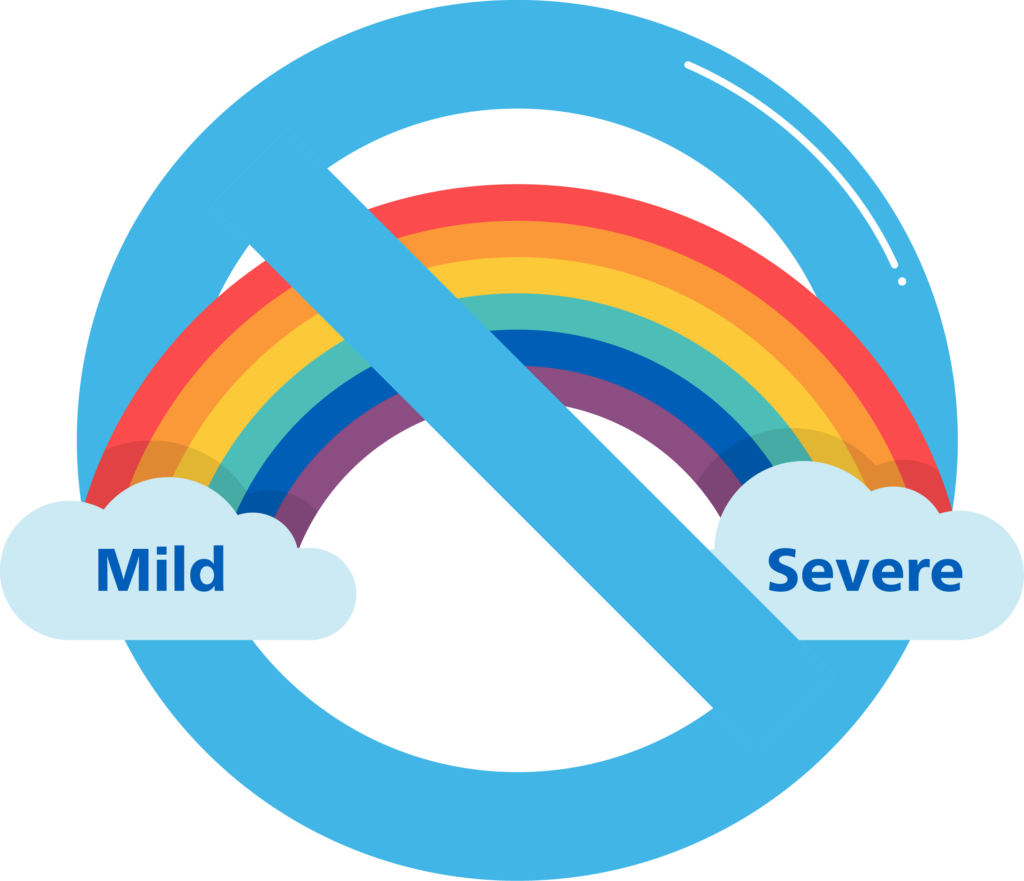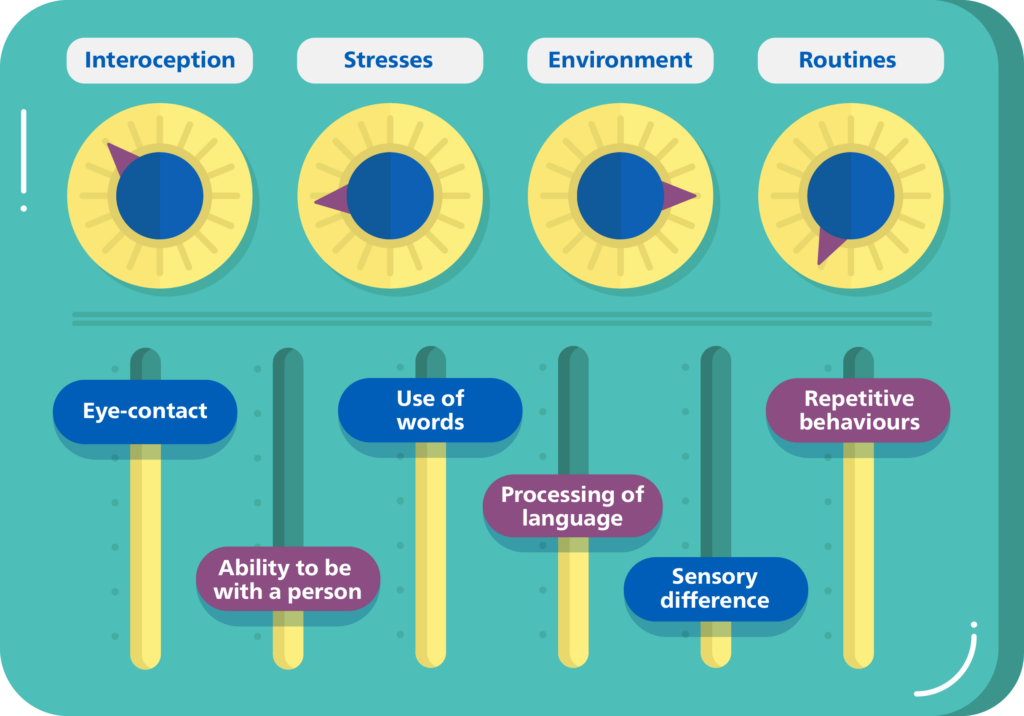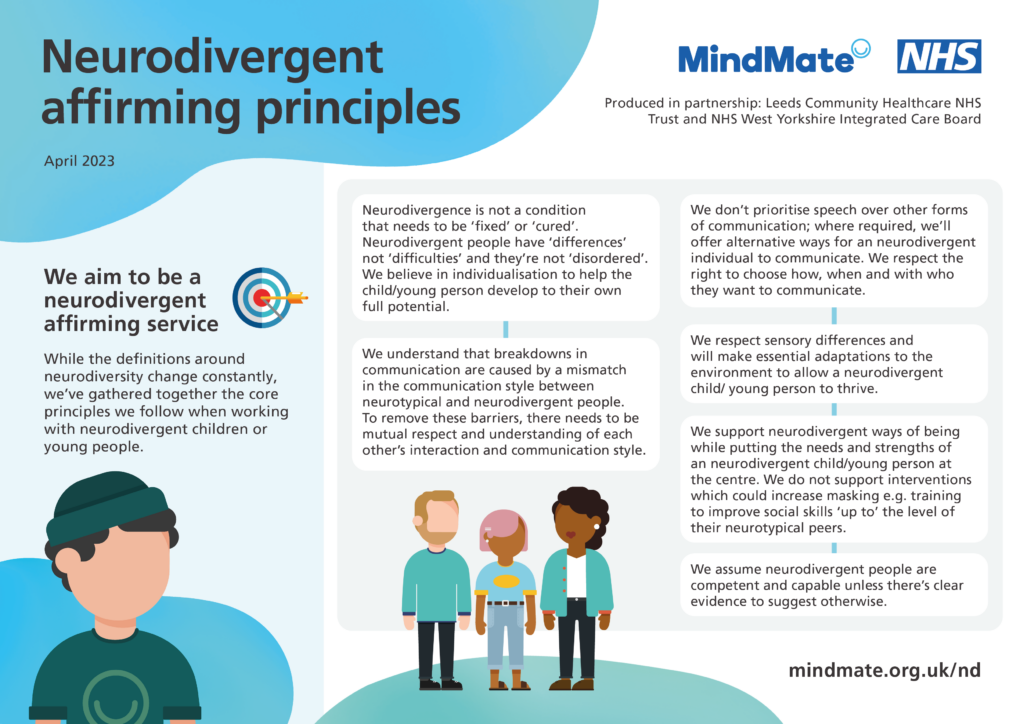Neurodivergent affirming
What is neurodivergent affirming?
Neurodivergent affirming (ND affirming) means seeing neurodivergence through a ‘strength-based’ lens and accepting all different neuro/brain-types as just that – different. Neurodivergent affirming means rejecting ‘medical’ models and language such as ‘disordered’, ‘deficit’ and ‘impairment’ that imply the person needs fixing.
Nevertheless, neurodivergent affirming does not mean that the challenges and needs of individuals are not acknowledged and supported. Every individual has the right to be seen in a positive way and to be valued in their community. Every individual also has the right to have their needs understood and to have their needs accommodated for and supported.
Neurodivergence is NOT linear, like it has previously been described, through images such as rainbows. This is not neurodivergent affirming, so we no longer these descriptions.

It is also not helpful to label different neurotypes (e.g. autism or ADHD) as mild/moderate/severe, or high/low functioning.
It is, in fact, a complex relationship between the impact of the environment, someone’s internal factors (mood, resilience) and their characteristics; a person’s neurodivergence may present differently or change in intensity across a day, week or month. For example, if an environment is overwhelming, a speaking individual may become non-speaking or withdraw from interaction.
The graphic equaliser image below illustrates how an individual’s characteristics and behaviours can change depending on their environment and internal factors at any moment. The image is based on an autistic person, as an example.

The top boxes show what can influence an individual’s autistic characteristics. The sliders underneath show examples of the characteristics and behaviours which may change. Therefore, it is unhelpful to label individuals with an overall ‘severity’ label, as these characteristics are not fixed.
Neurodivergent affirming language
The way people talk to and about us can significantly influence the way we see ourselves, our identity, and our value in the world. The way we are described and spoken about will also impact the way we then talk about ourselves.
It is important that we use language that recognises a person’s strengths and abilities while also acknowledging any challenges and needs. It is also important that we use language that enables others to feel accepted, appreciated and valued for who they are.
Neurodivergent affirming language has been particularly advocated for by the adult autistic community. However, the principles apply to the way we describe all individuals who feel and process things differently.
‘Identify first’ means using the identity description first, e.g. ‘autistic person’. ‘Person first’ means naming the person first, followed by the description, e.g. ‘person with ADHD’. Every individual will have their own preference of how they want to be referred to. The most important thing is to ask them and respect their preferences!
Autistic individuals often strongly prefer identify first language, e.g. autistic person. However, other neurotypes advocate for person first language, e.g. people with DLD.
Therefore, it is always best to ask the individual themselves how they would like to be referred to.
Different brain development and functions are now better understood to be just that – different! Not broken, disordered, or people with ‘deficits’. All groups of people/societies benefit from having a range of different people, with different ideas, different ways of thinking and different experiences. No one ‘type’ of person should be seen as always ‘right’ or ‘wrong’. It’s the mixture of different strengths and abilities that enables us to develop and move forward.
Not co-morbid – ‘co-occuring’ is a more accurate description of a person with more than one identified condition or neurotype, e.g. Autism and ADHD. ‘Co-morbid’ relates more to medical conditions and implies that something needs to be ‘treated’ or ‘fixed, which neurodivergence does not.
‘Characteristics’ is a more accurate and positive way to describe the skill areas and challenges individuals may show. ‘Symptoms’ implies that these personality characteristics need ‘treating’ which is not the case.
Individuals who do not frequently use verbal words and sentences to communicate often still may use verbal communication, such as laughing, sighing, humming etc. Therefore, it is more accurate and affirming to refer to these individuals as non-speaking, rather than non-verbal. Non-speaking also more accurately allows the consideration that the individual may understand verbal language, and use this in their communication, even if they do not use many verbal words themselves.
An individual’s functioning, needs and behaviours change depending on a wide range of internal and environmental factors, minute-to-minute, day-to-day, month-to-month. It is not helpful to label an individual overall as ‘high’ or ‘low’ functioning as their ability to carry out various tasks will constantly change. It is more helpful to describe the support an individual needs in specific contexts at that time. Please see the equaliser illustration above for more detail on this topic.
Describing that an individual is passionate about something, and that they thrive in consistent routine is a more positive and affirming way to understand that characteristic of their personality.
Neurodivergent-affirming principles poster
Please see our Neurodivergent-affirming principles poster below and share this with your friends, families, professionals and colleagues. This can also be downloaded here.

